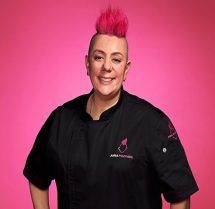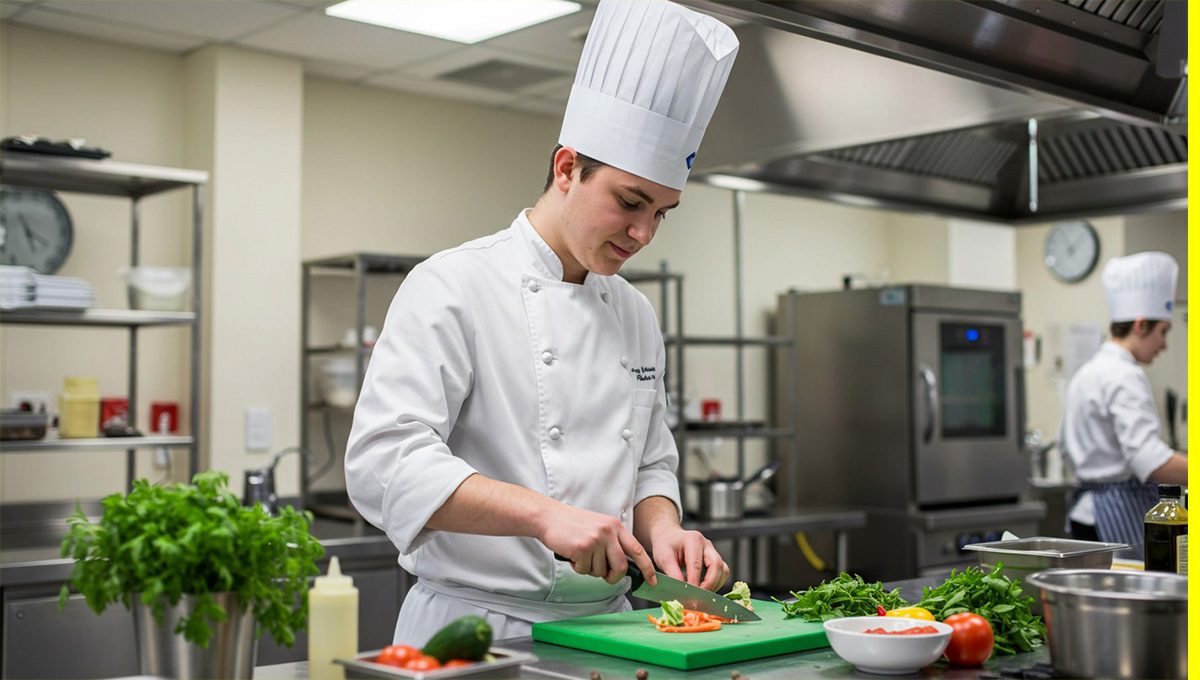5 Steps to Build a Personal Brand as a Hospitality Student
The hospitality industry is one of the fastest-growing global sectors, yet also one of the most competitive. Hotels, resorts, restaurants, airlines, and tourism companies constantly seek individuals who not only have the right technical skills but also stand out with a unique personal identity. For hospitality students, building a personal brand is no longer optional—it’s essential.
Think of personal branding as your professional reputation. It’s the impression you leave on professors, employers, colleagues, and even customers. In a field driven by service, experience, and trust, your brand becomes the story people tell about you when you’re not in the room.
 Take the example of Anthony Bourdain, who started as a culinary student before becoming a world-renowned chef, author, and TV host. He didn’t just cook food—he built a brand around storytelling, adventure, and authenticity. His career proves that hospitality students can shape their journey by presenting a clear, consistent identity.
Take the example of Anthony Bourdain, who started as a culinary student before becoming a world-renowned chef, author, and TV host. He didn’t just cook food—he built a brand around storytelling, adventure, and authenticity. His career proves that hospitality students can shape their journey by presenting a clear, consistent identity.
This article explores five powerful steps hospitality students can follow to build a personal brand that attracts opportunities, impresses employers, and sets them apart from the competition.
Step 1 – Define Your Unique Identity
The first step to building a strong personal brand is self-discovery. As a hospitality student, you need to understand what makes you different. Why should someone hire you over another candidate with the same degree? The answer lies in your unique strengths, passions, and career goals.
Understanding Your Strengths and Passions
Hospitality is a people-driven industry, but not every student fits the same mold. Some excel at guest relations, while others shine in event management, culinary arts, or hotel operations. By identifying your strengths early, you will be able to position yourself in the right niche.
Ask yourself:
Passion also plays a critical role. Employers can train you in systems, but passion is what fuels commitment. For instance, if sustainability excites you, your personal brand can emphasize eco-friendly hospitality practices.
Aligning Career Goals with Personal Values
Hospitality is broad, so your career direction should align with what matters to you. If luxury service appeals to you, aim for brands like Ritz-Carlton or Four Seasons. If community engagement drives you, consider working with tourism boards or boutique eco-lodges.
When your values match your career path, your brand feels more authentic. Employers notice when candidates speak passionately about their goals instead of rehearsed answers.
Case Study – How Anthony Bourdain Created a Global Identity
Anthony Bourdain was not the most polished chef when he started. What set him apart was his ability to tell stories and connect cultures through food.
By writing “Kitchen Confidential”, he gave the world a raw, honest view of the culinary world. That storytelling became his personal brand, eventually leading him to CNN and international fame.
His journey proves that hospitality students don’t need to fit into a mold. They need to find their unique voice and identity, then amplify it.
Step 2 – Build a Strong Online Presence
In today’s world, your personal brand lives online before it ever reaches a hiring manager’s desk. Employers, recruiters, and even customers will look you up. A well-crafted digital footprint can open doors to internships, jobs, and collaborations.
Crafting a Professional LinkedIn Profile
LinkedIn is the modern resume, but many students underestimate its value. A strong profile includes:
Recruiters often search LinkedIn for entry-level candidates. By positioning yourself well, you increase visibility.
Using Social Media to Showcase Skills
Beyond LinkedIn, platforms like Instagram, TikTok, and even YouTube can highlight your journey. Culinary students can share food creations, while event management students can showcase behind-the-scenes work. Social media should not just be personal—it can be professional too.
For example, you could start a small Instagram blog reviewing hotels or sharing hospitality tips. This shows initiative and passion, making you memorable to future employers.
 Example – How Anna Polyviou (Celebrity Pastry Chef) Built Her Brand Online
Example – How Anna Polyviou (Celebrity Pastry Chef) Built Her Brand Online
Anna Polyviou, now a celebrity pastry chef in Australia, started as a student passionate about desserts. Instead of keeping her creativity hidden, she showcased her bold and colorful creations online. Her Instagram presence, TV appearances, and collaborations turned her into a recognizable brand in the food industry.
Her journey highlights that social media, when used strategically, can launch a hospitality student into international recognition.
Step 3 – Gain Practical Experience Early
Nothing strengthens a personal brand more than real-world experience. Hospitality is not an industry where theory alone can help; it thrives on practice.
Importance of Internships and Volunteering
Internships give students exposure to hotel systems, guest service, and real operations. Even if unpaid, these experiences build credibility. Volunteering at local events, festivals, or community programs also helps students show initiative.
Employers value students who step out of classrooms and into real hospitality environments. This practical exposure becomes part of your personal brand story.
Leveraging Part-Time Jobs in Hospitality
Working part-time in restaurants, cafes, or hotels—even in basic roles like waiter, barista, or front desk assistant—adds value. These jobs teach skills like time management, communication, teamwork, and handling pressure.
When included in your personal branding, they prove that you have hands-on experience, not just academic knowledge.
Real-Life Example – How Ritz-Carlton Leaders Started with Entry-Level Roles
Many successful leaders at Ritz-Carlton began their careers as servers, receptionists, or housekeeping staff. These humble beginnings didn’t stop them from rising to senior leadership positions. Instead, they built their personal brand as people who understood hospitality from the ground up.
This shows hospitality students that no role is too small—it’s about how you use each opportunity to strengthen your identity.
Step 4 – Network and Build Industry Relationships
Hospitality thrives on relationships. Whether it’s building trust with guests or creating partnerships with professionals, networking is at the core of success in this industry. For hospitality students, developing a network early is like planting seeds that will grow into future opportunities.
Attending Hospitality Events and Competitions
Events, conferences, and competitions offer more than just learning—they are platforms to showcase your skills. For example, students participating in hospitality competitions like culinary challenges or barista contests gain visibility among industry leaders.
Attending international events such as World Travel Market or ITB Berlin may sound intimidating for students, but even local industry fairs or university career expos can be stepping stones. By asking thoughtful questions, introducing yourself to speakers, and following up after the event, you’re already building a professional presence.
Building Relationships with Mentors
A mentor can be a game-changer in shaping a student’s career. This could be a professor, an internship supervisor, or even an alumnus who has succeeded in hospitality. Mentors provide guidance, share industry insights, and often connect students with potential employers.
Approach mentors with respect and curiosity. Instead of asking directly for a job, seek advice. A question like, “What skills should I focus on as a student to succeed in this industry?” can open doors to deeper conversations. Over time, mentors often become strong advocates for your career.
Case Study – How Arne Sorenson (Former CEO of Marriott) Advanced through Networking
 Arne Sorenson, who became the first non-family CEO of Marriott International, was not originally from hospitality—he trained as a lawyer. However, his ability to network and build genuine relationships with people in the industry helped him transition and eventually lead one of the world’s largest hotel chains.
Arne Sorenson, who became the first non-family CEO of Marriott International, was not originally from hospitality—he trained as a lawyer. However, his ability to network and build genuine relationships with people in the industry helped him transition and eventually lead one of the world’s largest hotel chains.
His story reminds hospitality students that relationships can sometimes matter even more than technical skills. By investing in people, you invest in your personal brand.
Step 5 – Continuously Learn and Adapt
The hospitality industry is fast-moving. Guest expectations change, technology evolves, and global tourism trends shift rapidly. A strong personal brand must therefore show flexibility and adaptability.
Importance of Lifelong Learning in Hospitality
Graduating with a degree is not the end of learning—it’s only the beginning. Employers seek individuals who demonstrate curiosity and a willingness to grow. Hospitality students should attend workshops, earn certifications, or even learn new languages to strengthen their brand.
For example, being bilingual or multilingual instantly makes you more marketable in international hotels and airlines. Similarly, certifications in areas like food safety, digital marketing for tourism, or hotel management software can set you apart.
Staying Updated with Trends and Innovations
Hospitality is influenced by global trends: sustainability, digital booking platforms, smart hotels, and personalized guest experiences. A student who talks about these trends in interviews shows awareness and leadership potential.
Reading industry blogs, following hospitality news, and engaging in online communities keeps you informed. Sharing your insights on platforms like LinkedIn also reinforces your expertise.
Example – How Danny Meyer Reinvented His Career by Adapting to Trends
 Danny Meyer, founder of Union Square Hospitality Group and Shake Shack, built his reputation by constantly adapting. While many fine-dining restaurants resisted change, Meyer embraced casual dining trends with Shake Shack, creating a global brand.
Danny Meyer, founder of Union Square Hospitality Group and Shake Shack, built his reputation by constantly adapting. While many fine-dining restaurants resisted change, Meyer embraced casual dining trends with Shake Shack, creating a global brand.
His success illustrates that those who continuously learn and adapt remain relevant. Hospitality students can follow this example by being open-minded and innovative in their career paths.
Final Word
Personal branding is not just for CEOs or social media influencers—it’s essential for hospitality students who want to stand out in a crowded field.
By defining your identity, building an online presence, gaining practical experience, networking, and committing to lifelong learning, you’re not just preparing for a job—you’re preparing for a career that leaves a legacy.
Parents, teachers, and students alike should see personal branding as an investment. It builds confidence, creates opportunities, and positions students as leaders before they even graduate.
Hospitality is about creating memorable experiences for others. When you build your personal brand, you’re essentially creating a memorable experience for your future employers and colleagues. And that is the key to long-term success in this vibrant industry.
FAQs
1. Why should hospitality students start building a personal brand early?
Because the industry is competitive, starting early helps students stand out during internships, part-time jobs, and even graduate recruitment.
2. How can parents support their child’s personal brand journey?
Parents can encourage students to attend industry events, invest in professional development, and support them in internships or volunteer opportunities.
3. What role does social media play in personal branding for hospitality students?
Social media platforms allow students to showcase their talents, network with professionals, and share industry insights—boosting visibility and credibility.
4. How can a teacher help students develop their brand?
Teachers can mentor students, connect them with alumni, and encourage them to present at conferences or join competitions to strengthen their portfolio.
5. Is personal branding more important than academic performance in hospitality?
Both matter, but personal branding often gives students the edge when qualifications are similar. Employers want graduates who can represent their brand confidently.




